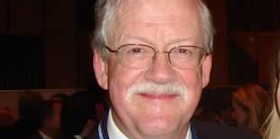The superficially “pro-gay” face of homophobia — which employs phrases like “reparative therapies” or “pastoral care” — has the potential to be far more destructive than the lyrics of a 25-year-old pop song. A kinder, gentler homophobia, in the media and in classrooms, uses language that appears sympathetic and inclusive yet masks the same old bigotry.
Yesterday a Conservative member of the European Parliament, Roger Helmer, tweeted: “Why is it OK for a surgeon to perform a sex-change operation, but not OK for a psychiatrist to try to ‘turn’ a consenting homosexual?” When asked about the tweet, Helmer maintained his intention wasn’t anti-gay.
Helmer, who insisted last year that he sees himself “as liberal and tolerant on the question of homosexuality,” told the Press Association that he had merely been asking “a question” about why psychiatrists were banned from offering therapy for homosexuality.
Advertisement
“I am always surprised by the instant indignation of a strident minority,” he said. “I am making a comparison between a lifestyle choice of a homosexual who would prefer not to be a homosexual and a lifestyle choice of a woman who would prefer to be a man …“

Big smile from MEP Roger Helmer.
The question comes as a psychotherapist in the UK, who practises a method of therapy called Sexual Orientation Change Efforts (SOCE), faces the loss of her accreditation from the British Association for Counselling and Psychotherapy (BACP).
Lesley Pilkington, 60, a psychotherapist for 20 years, was exposed by Patrick Strudwick, a gay journalist with The Independent who told Pilkington he was unhappy with his homosexual lifestyle and that he “wanted to leave it.”
In May 2009, Mr Strudwick attended a therapy session at Mrs Pilkington’s private practice, based at her home in Chorleywood, Herts, and recorded the session on a tape machine strapped to his stomach.
In the disciplinary letter sent to Mrs Pilkington, she is accused by BACP of “praying to God to heal him [Strudwick] of his homosexuality.” She is also accused of having an “agenda that homosexuality is wrong and that gay people can change and that you allegedly attempted to inflict these views on him.”
Like Helmer, Pilkington doesn’t see what she’s doing as homophobic. Instead, she sees her efforts as supportive.
Mrs Pilkington, whose 29-year-old son is homosexual, said she was motivated by a desire to help others. “He [my son] is heterosexual. He just has a homosexual problem,” she said last week.
Helmer and Pilkington are part of a new breed of homophobia our mainstream media seems to be largely ignoring. Instead of a hateful face — threatening hell-fire and damnation or violence — it uses terms like “reparative” or, in the case of the Ontario Catholic School Board, “pastoral care.”
Case in point: a recent article in the Ottawa Citizen applauding the efforts of Tom D’Amico, a superintendent for the Ottawa Catholic School Board.
“A student who is openly gay in our schools, we want all of our
students and staff to accept [them],” said Tom D’Amico, a
superintendent for the Ottawa Catholic School Board. “We don’t want to
see them marginalized in any manner.”
Sounds great on the surface. D’Amico’s efforts have been cited by others (including gay CUPE president Fred Hahn) as an example of a Catholic board that, unlike the Halton board, embraces its gay students. D’Amico says he “does not intend to use the Scripture to marginalize anyone.”
Yet we learn one paragraph later:
Here in Ottawa, D’Amico said the English Catholic school board doesn’t
use the name “gay-straight alliance” because the Assembly of OntarioBishops — to whom school boards look for spiritual guidance — prefer a
name that reflects a more general focus on equity and social justice.
So the board, is, in fact, using the scripture to marginalize students proud to declare themselves “gay,” but the article is so concerned with convincing us how progressive the Ottawa Catholic School Board is, it doesn’t explain this glaring contradiction.
Like Helmer and Pilkington, D’Amico frames his efforts as supportive of his gay students:
“I don’t focus on the title; I focus on the objectives and the end
result the group is trying to achieve in the schools,” D’Amico said.
“We don’t want to create a group whose title may result in increased
bullying, as opposed to decreasing it and creating better understanding
of individual differences.”
The Ottawa Catholic board, like the Halton Catholic board, prohibits gay-straight alliances, only they do it without using the word “ban.”
It’s time the media started asking the right questions and calling out this type of discrimination for the homophobia it is.
 Why you can trust Xtra
Why you can trust Xtra


